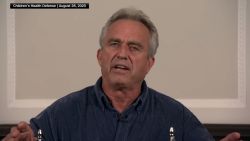For years, President Joe Biden has used a single phrase to diminish his onetime rival Donald Trump while signaling his own adherence to American political tradition: “You can’t love your country only when you win.”
As Biden conceded his vice president’s loss to Trump from the White House Rose Garden on Thursday, the line carried a different significance.
No longer finger-wagging at a defeated rival who refused to acknowledge his loss, Biden is now overseeing a transition back into office by the man he once – and still – believes is an existential threat to democracy.
Instead of using his final 10 weeks in power to cement his promise to act as a generational bridge and tout his signature accomplishments, Biden finds himself in one of the worst possible positions: A president acknowledging the loss of a race in which he was pushed out, preparing to be displaced by a man who for years he has cast as an existential threat to democracy in America.
Yet if those crushing factors are weighing deeply on Biden, his demeanor in the Rose Garden belied the hurt.
Seeking to comfort Americans scared of the prospects of another Trump term, while his own legacy remains in question, Biden was upbeat rather than downtrodden.
“Setbacks are unavoidable, but giving up is unforgivable,” the president said in the Rose Garden during his first public remarks since Trump’s victory over Vice President Kamala Harris. “We all get knocked down, but the measure of our character, as my dad would say, is how quickly we get back up.”
He was welcomed into the garden by a crowd of staffers and Cabinet members, who cheered for him as he walked from the Oval Office.
“Campaigns are contests of competing visions. The country chooses one or the other. We accept the choice the country made,” he said, making explicit that he accepted the results of the election.
“Remember,” Biden said, “a defeat does not mean we are defeated. We lost this battle. The America of your dreams is calling for you to get back up.”
Biden in his remarks was intentional in his efforts to endorse the sanctity of the election and acknowledge Trump’s resulting victory.
Within one day, both Biden and Harris conceded defeat and congratulated Trump, with efforts underway for the former and now-future president to visit the White House – all things Trump never did in the four years after his loss to Biden.
Biden drew implicit comparisons to the non-transition from four years ago, listing the steps he was taking that were never offered to him when he beat Trump. He also used the moment to again push back on questions of election integrity after years of false allegations from his predecessor — and now successor.
“I also hope we can lay to rest the question about the integrity of the American electoral system,” Biden said. “It is honest, it is fair, and it is transparent, and it can be trusted – win or lose.”
What comes next for Biden’s policy legacy is uncertain. Trump threatens to withdraw from some of the relationships with foreign powers that Biden had spent years personally developing during his time on the Senate Foreign Relations Committee. Few of Biden’s signature accomplishments can’t be undone by his successor.
In his speech, Biden suggested the true scope of his legacy won’t be known for years.
“Much of the work we’ve done is already being felt by the American people but the vast majority of it will not be felt – it’ll be felt over the next 10 years,” he said.
Yet as much as Biden could be remembered for his infrastructure law, his student-loan forgiveness program or his leadership through the country’s recovery from the pandemic, his legacy may hinge as much on how history judges his decision to stay in the race for as long as he did, depriving Harris of the chance to introduce herself to the country much earlier.
Delaware Sen. Chris Coons, who served as co-chair of both Biden and Harris 2024 campaigns and is one of the most outspoken supporters of the president, told CNN the day after the election that he was prepared to defend his friend from any Democratic finger-pointing.
“The Biden administration got a huge amount done, as you’ve heard me recite with great frequency. I do think the party has some soul-searching to do,” Coons said.
After ticking off policies that he said were widely popular that the Biden administration should be credited for – including lowering the prices of prescription drugs and investing in infrastructure projects – the senator lamented: “But (voters) do not recognize that that’s what he got done. So we need to think about how we communicate that.”
But if aides and allies of the president are eager to publicly defend Biden and his work, frustration is boiling over across the Democratic Party on his decision to seek a second term – despite his initial promise to be a “transition” and “bridge” candidate.
Had he stepped aside in the middle of his first term, the party would have had a chance to hold a primary contest and nominate their strongest candidate, they say – whether that would have ultimately ended up being Harris, or not.
“He should have stepped aside sooner,” said one former Biden administration official, before adding: “I just don’t know if that would have mattered.”
A senior Harris campaign official, who said they do not believe a competitive Democratic primary process would have put Harris at the top of the ticket this cycle, told CNN they blamed Biden’s own ego – and all of his top advisers who shot down any suggestion from Democrats that the party needed new leadership.
“The lack of a competitive process for a replacement; that he didn’t allow for that to happen – people are still angry about the shunning that they took for speaking out earlier about him,” the official said.
But Biden addressed none of those recriminations in the Rose Garden on Thursday. Yet even as he sought to project a sense of optimism during his short remarks, he betrayed a hint of doubt about the future.
“The road ahead is clear,” Biden said, “assuming we sustain it.”
This story has been updated with additional reporting.























